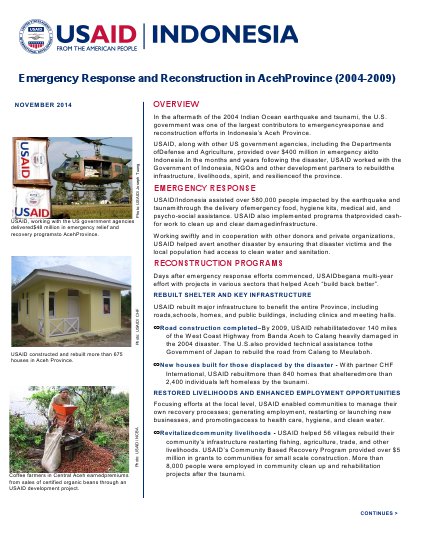Overview
In the aftermath of the 2004 Indian Ocean earthquake and tsunami, the U.S. government was one of the largest contributors to emergency response and reconstruction efforts in Indonesia’s Aceh Province.
USAID, along with other US government agencies, including the Departments ofDefense and Agriculture, provided over $400 million in emergency aid to Indonesia.In the months and years following the disaster, USAID worked with the Government of Indonesia, NGOs and other development partners to rebuildthe infrastructure, livelihoods, spirit, and resilience of the province.
EMERGENCY RESPONSE
USAID/Indonesia assisted over 580,000 people impacted by the earthquake and tsunamithrough the delivery of emergency food, hygiene kits, medical aid, and psycho-social assistance. USAID also implemented programs that provided cash-for work to clean up and clear damaged infrastructure.
Working swiftly and in cooperation with other donors and private organizations, USAID helped avert another disaster by ensuring that disaster victims and the local population had access to clean water and sanitation.
RECONSTRUCTION Programs
Days after emergency response efforts commenced, USAIDbegana multi-year effort with projects in various sectors that helped Aceh “build back better”.
REBUILT SHELTER AND KEY INFRASTRUCTURE
USAID rebuilt major infrastructure to benefit the entire Province, including roads,schools, homes, and public buildings, including clinics and meeting halls.
-
Road construction completed–By 2009, USAID rehabilitatedover 140 miles of the West Coast Highway from Banda Aceh to Calang heavily damaged in the 2004 disaster. The U.S.also provided technical assistance tothe Government of Japan to rebuild the road from Calang to Meulaboh.
-
New houses built for those displaced by the disaster - With partner CHF International, USAID rebuiltmore than 840 homes that shelteredmore than 2,400 individuals left homeless by the tsunami.
RESTORED LIVELIHOODS AND ENHANCED EMPLOYMENT OPPORTUNITIES
Focusing efforts at the local level, USAID enabled communities to manage their own recovery processes; generating employment, restarting or launching new businesses, and promotingaccess to health care, hygiene, and clean water.
-
Revitalizedcommunity livelihoods - USAID helped 56 villages rebuild their community’s infrastructure restarting fishing, agriculture, trade, and other livelihoods. USAID’s Community Based Recovery Program provided over $5 million in grants to communities for small scale construction. More than 8,000 people were employed in community clean up and rehabilitation projects after the tsunami.
-
Generated jobs and income for Acehnese farmers - As part of a program to enhance Aceh’s high value coffee production, USAID, in collaboration with the National Cooperative Business Association, trained more than 7,000 farmers in organic coffee production and establishing coffee processing facilities. Today,local farmers export tons of Grade One Certified Organic Coffee worldwide to buyers like Starbucks.
-
Trained Acehnese in applied technologies - USAID partnered with Chevron to develop the Aceh Polytechnic, a post-secondary institution focused on technology in areas like electrical engineering and information technology. The program prepares Acehnese students for careers in business and technical professions, improving the Province’s ability to attract new domestic and international investment.
PROVIDEDBASIC SERVICES AND PROTECTED THE VULNERABLE
USAID provided skills training and other educational opportunities to Acehnese, with a special emphasis on programs for women and youth.
-
Renovated and revitalized health clinics - Recognizing the importance of access to clean water and maternal and child health services to the future of Aceh, USAID’s Environmental Services and Health Services Programs constructed new water and sanitation systems, renovated and equipped area health clinics, and helped train area midwives and health professionals in nutrition, sanitation, pediatric care, and psycho-social services.
-
Improved the quality of basic education - USAID’s Decentralized Basic Education Program improved the quality of teaching and learning at 148 public and private elementary schools in the districts of Aceh Tengah, Bireuen, Pidie, Aceh Besar and Banda Aceh. The program strengthened education management at the district level, and improved teacher training through a network with local universities.
-
Reducedthe vulnerability of women and children - USAID, working with the Asia Foundation and local partners, launched a comprehensive anti-trafficking public awareness campaign and established Aceh’s first women’s crisis center that provided gender sensitivity training to Islamic Court judges, religious leaders, and legal scholars. USAID built new libraries and computer labs to promote girls education at Islamic boarding schools. Over2,250 women gained access to capital and business skills training.
STRENGTHENED CAPACITY AND GOVERNANCE
USAID helped Acehnese communities adapt to changes in the Province’s political environment and enhance their delivery of public services.
-
Assisted with key reconstruction coordination efforts - USAID provided technical assistance to the Aceh Rehabilitation and Reconstruction Agency (BRR) on housing policy, communications, disaster preparedness, logistics, and anti-corruption.
-
Increased accountability and transparency - USAID’s Local Governance Support Program trained more than 3,000 Acehnese government officials, legislators and community leaders in planning, budgeting, and management.
-
Enhanced disaster planning and response - USAID worked with communities to improve their planning in response to natural disasters and mitigate their impacts by making the community more resilient.








Comment
Make a general inquiry or suggest an improvement.